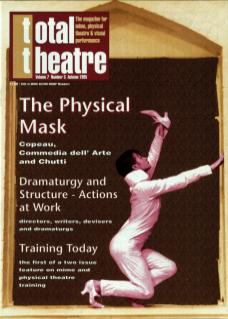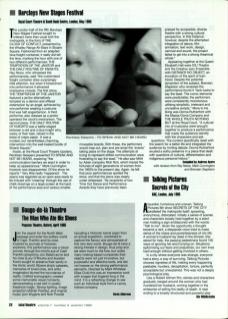The London half of the fifth Barclays New Stages Festival sought to interact more than usual with the metropolis, in the form of The Clock of Conflict, presented by the Whalley Range All Stars in Sloane Square. Fashioned from an adapted blue freight-container, it really did tell the time, marking the hour with one of two different performances: The Temptation of the Janitor and The Daily Routine of Knights. Ray Newe, who witnessed the performances, said ‘the customised freight container drew surprisingly little attention, but when it blossomed into performance it attracted impressive crowds. The first show, The Temptation of the Janitor featured a janitor alternatively tempted by a demon and offered redemption by an angel, achieved by one performer wearing a costume that was half angel/demon. A third performer, also dressed as a janitor, operated the clock's mechanism. The second piece, The Daily Routine of Knights was a battle staged between a red and a blue knight who, weary of their task, retired in the blaze of crepe paper. It was a modest, but nevertheless charming, intervention into the well-heeled bustle of Sloane Square.’
Inside, at the Royal Court Theatre Upstairs, Reckless Sleepers presented To Speak and not be Heard, exploring ‘the communication barriers we erect in order to keep up appearances’. Mark Cunnington however was disappointed. Of the show he reports: ‘Very little really happened. The space was regarded as an open area ready to be imbued with “meaning” through the use of chalk drawings on a large screen at the back of the performance area and various smaller, moveable boards. With these, the performers would map out, plan and pre-empt the “events” taking place on the stage. The attempts at trying to represent stifled communication were frustrating to say the least.’ He also saw Maa by Asian company Moti Roti, which traced the fortunes of eight generations of women from the 1850s to the present day. Again, he felt that poor performances spoiled the show, and that the piece was clearly under rehearsed. ‘As recipients of two Time Out Dance and Performance Awards they have previously been praised for accessible, diverse theatre with a strong cultural perspective. In this instance, however, despite the attempted integration of dance, film animation, text work, design, carnival and sound, the project failed to gel into a strong theatrical whole.’
Appearing together at the Queen Elizabeth Hall were IOU Theatre and the Creative Jazz Ensemble with Distance No Object, an evocation of the spirit of train travel. Despite the potential dynamism of the subject, Brendan Stapleton, who reviewed the performance, found it ‘lacklustre to say the least. The comic elements were predictable; the performers were consistently monotonous, utilising simplistic, irrelevant and uncreative scripts.’ More to his liking was Donna Rutherford with the Massa-Donia Company and The Whole Truth Nothing But at the Royal Court. ‘A cultural mix of musicians were brought together to produce a performance that made the audience identify with the characters and ask questions. The content specifically dealt with the search for a better life and integrated the audience by inviting debate. Donna Rutherford exuded a sultry presence in a piece that dealt with questions of cultural differentiation and indigenous personal history.’

